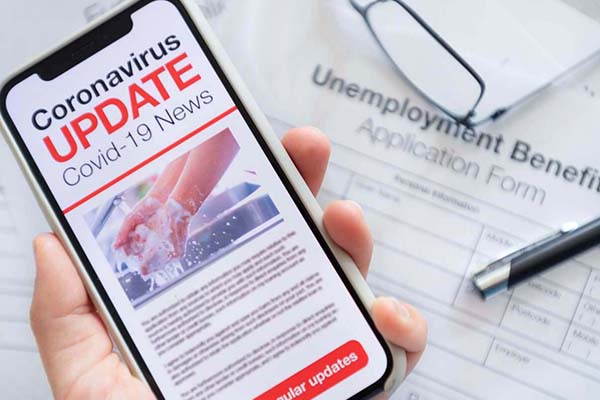What You Need to Know About COVID-19 Unemployment Benefits
As businesses shut their doors to combat the novel coronavirus, millions of Americans are applying for unemployment. In response to the pandemic, federal and state governments have also enacted special coronavirus unemployment benefits.
The good news: You may now qualify whether you’re out of work, furloughed, or had your hours cut, and the extra income can help you cover your expenses during this difficult time. If you do need to file, here’s everything you need to know to maximize your benefits:
5 Quick Steps to Take Now if You’ve Lost Your Job:
Getting laid off is stressful enough without having to worry about your next move. If you’re feeling overwhelmed, take these steps now:
1. Start early: With a surge of applications, some people are experiencing long wait times. Apply for unemployment benefits as soon as possible.
2. Check your company-sponsored severance package: If your former employer is offering a severance package, you’ll need to know how much to expect before you can get unemployment benefits.
3. File for unemployment: File for unemployment benefits online by using the state-by-state chart below.
4. Cut down to an ‘essentials-only’ budget: Look for ways to trim your budget.
5. Don’t stress: Ask for help if you need it! Unemployment offices offer counseling assistance at no cost to you.
Expanded Coronavirus Unemployment Benefits
The federal Coronavirus Aid, Relief, and Economic Security (CARES) Act makes temporary changes to unemployment, increasing how much you could receive and expanding coverage. The changes include:
- Giving recipients $600 a week in addition to their state-provided benefits. The additional benefit will end July 31 2020, or when you start working again.
- Increasing unemployment benefits by 13 weeks. In most states, workers will be eligible for 39 total weeks, though the timeline varies by state.
- Expanding coverage to the self-employed, including contractors, freelancers, and gig workers.
- Allowing states to waive the one-week waiting period before you can begin collecting benefits.
- Offering unemployment to people who can’t work because of certain coronavirus-related reasons, such as their company temporarily closing, being advised to self-quarantine, or caring for a family member due to coronavirus.
Basic Qualification Requirements
The CARES Act has expanded coverage, but you’ll still need to meet your state’s requirements. Generally, to qualify:
- You must be laid off through no fault of your own. However, in some cases, you may still qualify if you quit or were fired.
- You must meet the minimum earnings or tenure requirements. Many states determine a “base period” (such as a full year) that you must have worked or earned a certain amount to qualify.
- You are actively seeking work (may be waived). You normally have to be actively looking for a new job, but some states are temporarily waiving this requirement during the pandemic.
- You are legally authorized to work in the United States. Undocumented immigrants don’t qualify for unemployment benefits.
Self-employed or gig workers generally don’t qualify for unemployment, but the CARES Act created a Pandemic Unemployment Assistance (PUA) program covering self-employed people who can’t work—or can’t work as much—because of COVID-19. Eligible self-employed workers can apply through their state’s unemployment office.
How to File for Coronavirus Unemployment Benefits
While some changes have come from the federal government, there isn’t a special coronavirus unemployment filing process. You’ll apply for unemployment through your state’s labor or employment department.
Generally, you’ll need to share:
- Your name, address, phone number, Social Security number, and driver’s license number.
- Your bank account information if you want to receive direct deposits.
- Your employment history, including the names and contact information for the companies and your supervisors.
- Your previous income.
- Why you’re no longer working.
If you worked in a different state or in multiple states, you can file in your home state, but other states’ rules can affect how much you receive.
Start As Soon As Possible and Prepare to Wait
Unemployment offices across the country are working hard to keep up with the high demand, and many are overwhelmed by the number of applications. Check your state’s website for the latest updates, as some states are asking people to apply on certain days based on their name or Social Security number.
State-by-State Guidelines
Unemployment rules vary by state. You can find your state’s unemployment requirements here:
| State or Territory | Unemployment Phone Line | Website |
| Alabama | 866-234-5382 | www.labor.alabama.gov |
| Alaska | 888-252-2557 | www.labor.state.ak.us |
| Arizona | 877-600-2722 | www.azui.com |
| Arkansas | 800-461-9941 | www.dws.arkansas.gov/unemployment/ |
| California | 800-300-5616 | www.edd.ca.gov |
| Colorado | 800-388-5515 | www.coloradoworkforce.com |
| Connecticut | 800-942-6653 | www.ctdol.state.ct.us |
| Delaware | 800-794-3032 | www.delawareworks.com |
| District of Columbia | 877-319-7346 | www.dcnetworks.org |
| Florida | 800-204-2418 | https://connect.myflorida.com |
| Georgia | 877-709-8185 | www.dol.state.ga.us |
| Hawaii | 877-215-5793 | www.hawaii.gov/labor/ui |
| Idaho | 208-332-3574 | www.labor.idaho.gov |
| Illinois | 800-244-5631 | www.ides.state.il.us |
| Indiana | 800-891-6499 | www.in.gov/dwd |
| Iowa | 866-239-0843 | www.iowaworkforce.org/ui |
| Kansas | 800-292-6333 | www.getkansasbenefits.gov |
| Kentucky | 502-875-0442 | www.kewes.ky.gov |
| Louisiana | 866-783-5567 | www.laworks.net |
| Maine | 800-593-7660 | www.maine.gov/labor |
| Maryland | 410-949-0022 | www.dllr.state.md.us |
| Massachusetts | 617-626-6800 | www.mass.gov/lwd |
| Michigan | 866-500-0017 | www.michigan.gov/uia |
| Minnesota | 877-898-9090 | www.positivelyminnesota.com |
| Mississippi | 888-844-3577 | www.mdes.ms.gov |
| Missouri | 800-320-2519 | www.labor.mo.gov/DES/ |
| Montana | 406-444-2545: Helena406-247-1000: Billings | http://uid.dli.mt.gov/ |
| Nebraska | 402-458-2500 | www.dol.nebraska.gov/ |
| Nevada | 888-890-8211: Rural and out-of-state callers(775) 684-0350: Northern Nevada (702) 486-0350: Southern Nevada | www.nvdetr.org |
| New Hampshire | 800-266-2252 | www.nhes.nh.gov/ |
| New Jersey | 888-795-6672 | https://myunemployment.nj.gov/ |
| New Mexico | 877-664-6984 | www.dws.state.nm.us |
| New York | 888-209-8124 | https://www.labor.ny.gov |
| North Carolina | 877-841-9617 | https://des.nc.gov/ |
| North Dakota | 701-328-4995 | www.jobsnd.com |
| Ohio | 877-644-6562 | unemployment.ohio.gov/ |
| Oklahoma | 800-555-1554 | www.ok.gov/oesc_web |
| Oregon | 877-345-3484 | https://www.oregon.gov/ |
| Pennsylvania | 888-313-7284 | www.uc.pa.gov |
| Puerto Rico | 787-945-7900 | www.trabajo.pr.gov |
| Rhode Island | 401-243-9100 | www.dlt.ri.gov/ui |
| South Carolina | 803-737-2400 | https://dew.sc.gov/ |
| South Dakota | 605-626-3179 | www.sd.uiclaims.com |
| Tennessee | 877-813-0950 | https://www.tn.gov/workforce/unemployment/apply-for-benefits.html |
| Texas | 800-939-6631 | ui.texasworkforce.org |
| Utah | Salt Lake and South Davis Counties (801) 526-4400 Weber and North Davis Counties (801) 612-0877 Utah County (801) 375-4067 Remainder of State and Out of State 1-888-848-0688 | https://jobs.utah.gov/ui/home |
| Vermont | 877-214-3330: Initial claim | labor.vermont.gov |
| Virginia | 866-832-2363 | http://www.vec.virginia.gov/unemployed |
| Virgin Islands | 800-939-6631 (TWC) 340-776-3700: St. Thomas 340-773-1994: St. Croix | https://www.vidol.gov/unemployment-insurance/ |
| Washington | 800-318-6022 | www.esd.wa.gov |
| West Virginia | 800-379-1032 | www.uc.workforcewv.org/consumer/ |
| Wisconsin | 844-910-3661 | dwd.wisconsin.gov/uiben/ |
| Wyoming | 866-729-7799 | www.wyomingworkforce.org |
How Much Will You Receive With Coronavirus Unemployment Benefits?
States use complex formulas to determine your weekly benefits. It can depend on your earnings, although each state also has a minimum and maximum weekly benefit amount. In some states, you may receive an additional benefit if you have dependents.
Standard unemployment benefits generally won’t replace your income. However, with the extra $600 a week from the CARES act, low- and medium-wage earners could receive the same amount—or even more—than they were earning before.
While some states are still setting up systems to disburse the money, the additional $600 benefit is retroactive. Anyone who is eligible and collected benefits starting the week of March 29 will receive the additional funds when disbursement starts.
Unemployment benefits are also taxable, and you’ll have to include the income on your tax return. However, the $600 benefit won’t affect your income when you’re applying for Medicaid or the Children’s Health Insurance Program. To avoid a big tax bill later, you can choose to have some of the money withheld when you apply for benefits.
Quicken has made the material on this blog available for informational purposes only. Use of this website constitutes agreement to our Terms of Use and Privacy Policy. Quicken does not offer advisory or brokerage services, does not recommend the purchase or sale of any particular securities or other investments, and does not offer tax advice. For any such advice, please consult a professional.



